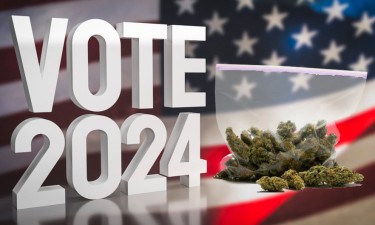
Surprise Poll: Republicans Actually LOVE Cannabis Freedom (So What's the Holdup?)
Well, folks, it's time to throw another tired stereotype into the garbage bin. According to a fresh poll conducted by none other than Trump's own pollster, Republicans aren't just warming up to cannabis legalization—they're downright enthusiastic about it, especially when it comes to states' rights to make their own decisions without federal interference.
The survey by Fabrizio, Lee & Associates (whose principal, Tony Fabrizio, served as pollster for Trump's 2016 and 2024 presidential campaigns) found something that might shock the mainstream media narrative: GOP voters are "even more supportive" of allowing states to set their own cannabis policies without federal interference (72%) than the general voting population (68%).
Let that sink in for a moment. The party stereotypically associated with "Just Say No" and tough-on-crime policies is now leading the charge on cannabis federalism.
This isn't just a minor shift in opinion—it's a seismic realignment that destroys the conventional wisdom about cannabis being a partisan issue. Yet despite overwhelming support across the political spectrum, federal cannabis reform continues to move at a glacial pace. Meanwhile, a new bipartisan bill called the PREPARE Act has just been introduced to develop a comprehensive plan for federal legalization.
So what gives? If voters of all stripes want cannabis reform, why can't politicians deliver? Let's dig into the numbers, the politics, and what you can do to help push this boulder over the finish line.
The Numbers Don't Lie: Americans Want Cannabis Freedom
The Fabrizio poll doesn't just show marginal support for cannabis reform—it reveals overwhelming, cross-partisan enthusiasm for ending prohibition. Among registered voters overall, 66% favor legalizing marijuana with just 25% opposed. But the real surprise is that Republicans now favor legalization by a double-digit margin, 53-37%.
Furthermore, solid majorities of both general voters (70%) and GOP+ voters (67%) support rescheduling cannabis—a reform currently under consideration by the DEA, though the process has stalled in recent months.
Even banking reform for the cannabis industry, long blocked in Congress despite bipartisan support, is backed by 54% of voters initially, rising to 63% once respondents receive additional information about the policy.
As the polling firm's memo concluded: "There is no significant political or demographic group that doesn't believe cannabis should be legal for consenting adults."
These findings align with broader polling trends showing that cannabis legalization has become a remarkably unifying issue in our otherwise divided political landscape. The question isn't whether Americans support legalization—they clearly do—but why Congress continues to drag its feet despite this mandate from voters.
The Political Paradox: Why Legalization Stalls Despite Support
If you're scratching your head wondering why politicians can't seem to pass something that most of their constituents want, you're not alone. This disconnect between public opinion and political action on cannabis represents one of the stranger paradoxes in American politics today.
Several factors help explain this legislative inertia:
1. The Silent Majority Effect: While support for legalization is broad, it's often not a top priority issue for most voters. Cannabis consumers and advocates are passionate, but they rarely vote solely on this issue. Meanwhile, the shrinking minority who oppose legalization may be more vocal and single-issue oriented in their political engagement.
2. Industry Opposition: Powerful industries including pharmaceuticals, alcohol, private prisons, and police unions have financial interests in maintaining prohibition and employ significant lobbying resources to slow reform efforts.
3. Generational Divide in Leadership: While younger Republicans increasingly support legalization, party leadership skews older and remains more hesitant. The same generational gap exists among Democrats, though to a lesser extent.
4. Scheduling Inertia: The classification of cannabis as a Schedule I substance creates a bureaucratic and legal maze that requires significant political capital to navigate, making it easier for politicians to kick the can down the road.
5. Credit Claiming Concerns: Neither party wants to give the other a "win" on a popular issue, creating a perverse incentive to block progress even when they agree on the goal.
This political stalemate persists despite cannabis legalization being what policy wonks would call a "valence issue"—something where the desired outcome (letting adults make their own choices while generating tax revenue and reducing unnecessary incarceration) has broad support across partisan lines.
New Hope: The Bipartisan PREPARE Act
Against this backdrop of frustrating inaction, there's a new legislative effort that could finally break the logjam. On April 17, an unlikely political duo—House Democratic Leader Hakeem Jeffries of New York and Ohio Republican Rep. Dave Joyce—introduced the Preparing Regulators Effectively for a Post-Prohibition Adult-Use Regulated Environment (PREPARE) Act.
This bipartisan bill takes a pragmatic approach to ending federal prohibition by directing the U.S. Attorney General to establish a "Commission on the Federal Regulation of Cannabis" within 30 days of the bill's enactment. This commission would be tasked with analyzing existing regulatory models for alcoholic beverages and using those findings to develop recommendations for federally legalizing cannabis.
The commission would have 12 months to submit a report to Congress addressing several key issues:
-
The impacts of cannabis criminalization, particularly on minority, veteran, and low-income communities
-
Product safety standards and labeling requirements
-
Banking services for regulated cannabis businesses
-
Barriers to cannabis research
-
Tax collection frameworks
-
Interstate commerce considerations
-
Protecting the coexistence of hemp and cannabis industries
"Currently, nearly all 50 states have legalized or enacted cannabis to some degree, bringing us closer to the inevitable end to federal cannabis prohibition," Rep. Joyce said in his statement introducing the bill. "Recognizing this reality, the PREPARE Act delivers a bipartisan plan."
Rep. Jeffries was even more direct in his assessment: "Since the failed war on drugs began more than 50 years ago, the prohibition of marijuana has ruined lives, families and communities, particularly communities of color. The PREPARE Act is one of the bipartisan solutions that will lay the groundwork to finally right these wrongs in a way that advances public safety and boosts our economy."
Another piece of legislation, the Strengthening the Tenth Amendment Through Entrusting States (STATES) 2.0 Act, was also reintroduced last week. This bill would amend the federal Controlled Substances Act to remove criminal penalties for cannabis activities that are legal under state or tribal marijuana regulations.
These bills represent the most serious bipartisan efforts in years to address federal cannabis reform, suggesting that the political logjam may finally be breaking.
What You Can Do to Help the Movement
If you're reading this and wondering how you can help push cannabis reform over the finish line, here are some concrete actions you can take:
1. Contact Your Representatives: Call, email, or write to your members of Congress and specifically express support for the PREPARE Act (H.R. 2935) and the STATES 2.0 Act. Personal communications from constituents carry real weight, especially when they focus on specific legislation rather than general positions.
2. Share the Polling Data: Many politicians and voters still believe cannabis is a divisive issue. Share the Fabrizio poll results and other surveys showing the broad, bipartisan support for reform. Social media is a powerful tool for shifting public perceptions.
3. Register and Vote: Support candidates who prioritize cannabis reform, regardless of party. Look beyond rhetoric to actual voting records and sponsored legislation.
4. Support Advocacy Organizations: Groups like NORML, the Marijuana Policy Project, and Americans for Safe Access are doing the hard work of lobbying and public education. Consider donating or volunteering.
5. Talk About It: One of the most powerful things you can do is simply normalize conversations about cannabis. Whether you're a consumer or not, speaking openly about reform helps dispel lingering stigma.
6. Engage Locally: While federal reform is crucial, much of the progress happens at state and local levels. Attend city council meetings, participate in public comments on local regulations, and support sensible policies in your community.
7. Business Owners, Join Industry Associations: If you're in the cannabis industry or an adjacent field, join industry associations that lobby for reform. The collective voice of small business owners can be particularly persuasive to legislators.
The Sticky Bottom Line: It's About Freedom, Not Partisanship
The most revealing aspect of the Fabrizio poll isn't just the high level of support for cannabis reform, but the fact that Republicans are leading on the states' rights question. This suggests that cannabis freedom resonates deeply with core conservative principles of limited government and personal liberty.
At its heart, cannabis legalization isn't about partisan politics—it's about whether adults should be free to make their own choices without government interference, whether states should be able to set their own policies without federal overreach, and whether we should continue spending billions on failed prohibition policies when we could be generating tax revenue and creating jobs instead.
The cost of prohibition—both financially and in human terms—far exceeds any potential benefits. Americans across the political spectrum have recognized this reality. Now it's time for their elected representatives to catch up.
With new bipartisan legislation and overwhelming public support, we have the best opportunity in generations to end the failed policy of cannabis prohibition. The question isn't if federal legalization will happen, but when—and whether we'll all do our part to make it happen sooner rather than later.
The next time someone tells you cannabis is a partisan issue, or that Republicans oppose legalization, show them the numbers. Then ask them to join you in supporting the PREPARE Act and other bipartisan efforts to finally bring America's cannabis policies into alignment with the will of the people—all the people, regardless of political affiliation.







